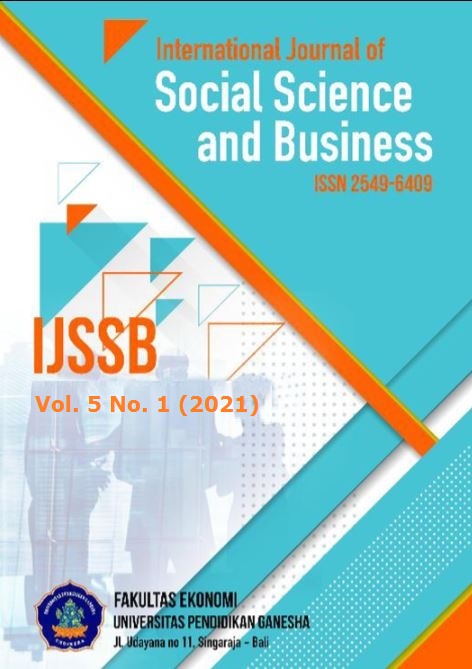Good Corporate Governance Affects Company Value with Earnings Management as Intervening Variables in BUMN
DOI:
https://doi.org/10.23887/ijssb.v5i1.31530Keywords:
GCG, Earnings Management, Tobins'QAbstract
Increasing company value is carried out by management (agents) who manage the company so that it triggers a conflict of interest so that Good Corporate Governance (GCG) is needed. One of the conflicts of interest is practicing earnings management. This study aims to analyze the effect of GCG on firm value mediated by earnings management. The sample used is 19 state-owned companies registered on the Indonesia Stock Exchange in 2017-2019. This study uses SEM-PLS analysis techniques to analyze data. The results showed that GCG had a negative effect on firm value and earnings management. Earnings management does not affect firm value. Earnings management, which is used as an intervening variable, cannot mediate the relationship between GCG and firm value. The limitations in this study are ignoring the variety of industries in BUMN, which may mean that each industry has different policies or practices on GCG and earnings management and different pressures from the market (investors).
References
Afriyadi, A. D. (2019). Kisruh Laporan Keuangan Garuda: Ditolak Komisaris hingga Terbukti Cacat. https://finance.detik.com/bursa-dan-valas/d-4603814/kisruh-laporan-keuangan-garuda-ditolak-komisaris-hingga-terbukti-cacat.
Asian Development Bank Corporation. (2017). ASEAN Corporate Governance Scorecard Country Reports and Assessments 2015. Asian Development Bank.
Astrini, S. F., Biekayanti, G., & Suhardjanto, D. (2005). Praktik corporate governance dan nilai perusahaan BUMN di Indonesia. Jurnal Akuntansi, XIX(01), 1–30. http://dx.doi.org/10.24912/ja.v19i1.111.
Chtourou, S. M., Bedard, J., & Courteau, L. (2001). Corporate governance and earnings management. SSRN Electronic Journal. https://doi.org/10.2139/ssrn.275053.
Darmadji, T., & Fakhruddin, H. M. (2011). Pasar modal di Indonesia. Salemba Empat.
Dechow, P. M., Sloan, R. G., & Sweeney, A. P. (2015). Detecting earnings management. Asian Financial Statement Analysis, 70(2), 73–105. https://doi.org/10.1002/9781119204763.ch4.
Fallatah, Y., & Dickins, D. (2012). Corporate governance and firm performance and value in Saudi Arabia. African Journal of Business Management, 6(36), 10025–10034. https://doi.org/10.5897/AJBM12.008.
Fernandes, N. G., & Ferreira, M. A. (2007). The Evolution of Earnings Management and Firm Valuation: A Cross-Country Analysis. In EFA 2007 Ljubljana Meetings Paper. https://doi.org/10.2139/ssrn.965636.
Gill, A., Biger, N., Mand, H. S., & Mathur, N. (2013). Earnings management, firm performance, and the value of indian manufacturing firms. International Research Journal of Finance and Economics, 116. https://scholarworks.waldenu.edu/sm_pubs/65/.
Harmono. (2009). Manajemen keuangan: Berbasis balanced scorecard pendekatan teori, kasus dan riset bisnis. Bumi Aksara.
Hermiyetti, & Manik, E. N. (2013). The influence of good corporate governance mechanism on earnings management : Empirical study in indonesian stock exchange listed company for periods of 2006-2010. Indonesian Capital Market Review, 5(1). https://doi.org/10.21002/icmr.v5i1.1583.
Kamran, & Shah, A. (2014). The impact of corporate governance and ownership structure on earnings management practices : evidence from listed companies in Pakistan. The Lahore Journal of Economics, 2, 27–70. https://doi.org/10.35536/lje.2014.v19.i2.a2.
Lee, T., Road, D.-H., Ku, C., Chen, H., & Chen, J. (2012). A study of corporate governance factors and earnings management behaviors of Taiwan public companies. International Journal of Business, Humanities and Technology, 2(5), 79–88. http://ijbhtnet.com/journals/Vol_2_No_5_August_2012/8.pdf.
Lestari, N., & Ningrum, S. A. (2018). Pengaruh manajemen laba terhadap nilai perusahaan dengan tax avoidance sebagai variabel vediating. Journal of Applied Accounting and Taxation, 1(3), 99–109. https://doi.org/10.30596/liabilities.v1i3.2496.
Lindenberg, E. B., & Ross, S. A. (1981). Tobin’s q ratio and industrial organization. The Journal of Business, 54(1), 1. https://doi.org/10.1086/296120.
Mahrani, M., & Soewarno, N. (2018). The effect of good corporate governance mechanism and corporate social responsibility on financial performance with earnings management as mediating variable. Asian Journal of Accounting Research, 3(1), 41–60. https://doi.org/10.1108/AJAR-06-2018-0008.
McKinsey & Company. (2001). Investor opinion survey on corporate governance. McKinsey and Company.
Murwaningsih, E. (2008). Pengaruh corporate governance terhadap nilai perusahaan dengan manajemen laba sebagai variabel intervening (Studi pada perusahaan manufaktur di BEJ). Jurnal Ekonomi: Media Ilmiah Indonesia, 13(2), 364–383. http://riset.unisma.ac.id/index.php/jrm/article/view/4449.
Mutmainah. (2015). Analisis good corporate governance terhadap nilai perusahaan. Eksis: Jurnal Riset Ekonomi Dan Bisnis, Vol. X(No.2, Oktober), pp: 1-15. https://doi.org/https://doi.org/10.26533/eksis.v10i2.63.
Perwitasari, D. (2014). Struktur kepemilikan, karakteristik perusahaan, dan manajemen laba. Jurnal Akuntansi Multiparadigma, 5(3). https://doi.org/10.18202/jamal.2014.12.5032.
Purbopangestu, H. W., & Subowo. (2014). Pengaruh good corporate governance terhadap nilai perusahaan dengan corporate social responsibility sebagai variabel intervening. Accounting Analysis Journal, 3(3). https://doi.org/10.15294/aaj.v3i3.4202.
Putri, C. A. (2020). Kacau! BPK Sebut Jiwasraya Manipulasi Laba. https://www.cnbcindonesia.com/market/20200108162637-17-128611/kacau-bpk-sebut-jiwasraya-manipulasi-laba.
Salim, J. (2010). 108 Tanya Jawab Tentang Investasi. Visimedia.
Sloan, R. G. (1996). Do stock prices fully reflect information in accruals and cash flows about future earnings? Accounting Review, 71(3), 289–315. https://www.jstor.org/stable/248290.
Suhadak, S., Kurniaty, K., Handayani, S. R., & Rahayu, S. M. (2019). Stock return and financial performance as moderation variable in influence of good corporate governance towards corporate value. Asian Journal of Accounting Research, 4(1), 18–34. https://doi.org/10.1108/ajar-07-2018-0021.
Tangjitprom, N. (2013). The role of corporate governance in reducing the negative effect of earnings management. International Journal of Economics and Finance, 5(3), 213–220. https://doi.org/10.5539/ijef.v5n3p213.
Tjandrakirana DP, R., & Monika, M. (2014). Pengaruh kinerja keuangan terhadap nilai perusahaan pada perusahaan manufaktur yang terdaftar di Bursa Efek Indonesia. Jurnal Manajemen Dan Bisnis Sriwijaya, 12(1), 1–16. https://doi.org/10.29259/jmbs.v12i1.3136.
Uwuigbe, U., Peter, D. S., & Oyeniyi, A. (2014). The effects of corporate governance mechanisms on earnings management of listed firms in Nigeria. Journal of Accounting and Management Information Systems, 13(1), 159–174. http://eprints.covenantuniversity.edu.ng/8127/.
Watts, R. L., & Zimmerman, J. L. (1986). Positive accounting theory. Englewood Cliffs, N.J: Prentice-Hall.











